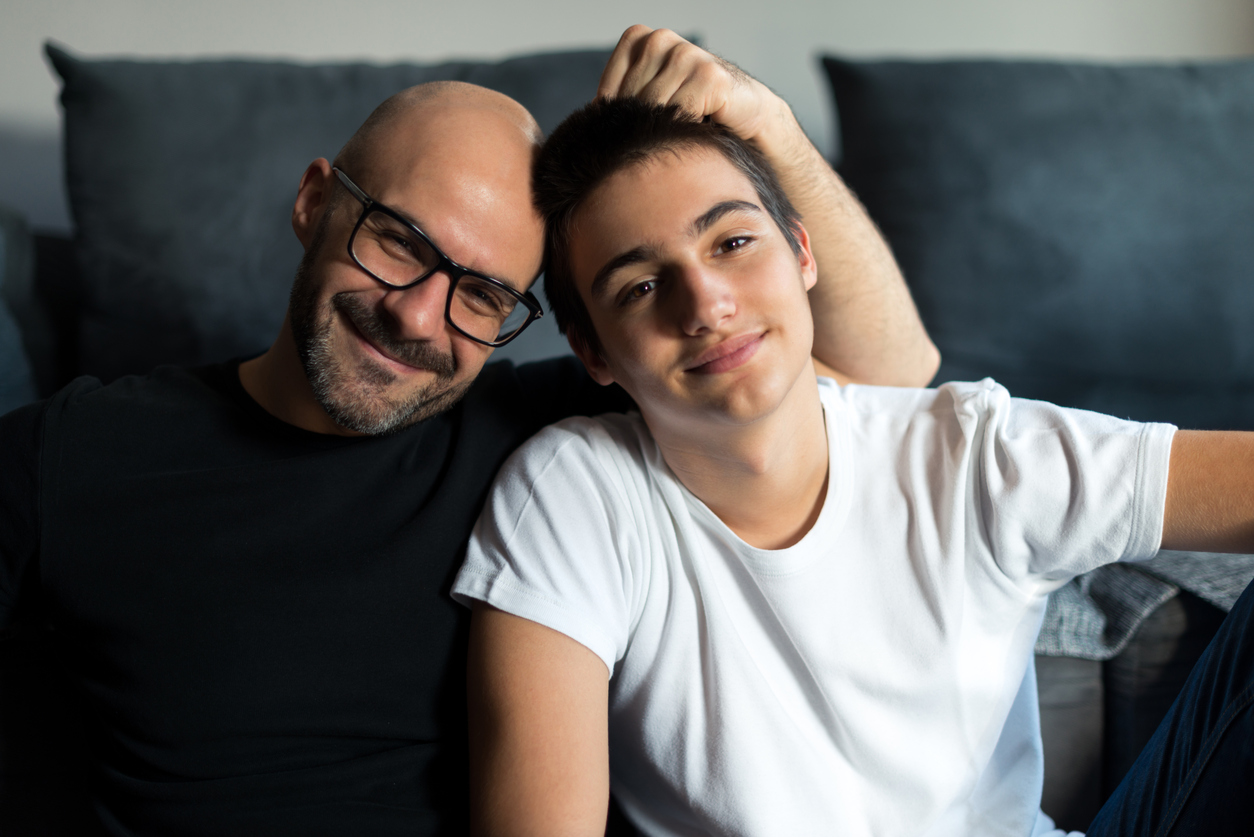
Parents and Teens: The Social Media Gap
Posted January 21, 2014, 4:04 pm by
I have two teens. As a parent, I’m focused on raising healthy, independent young adults (and I hope that we still like each other throughout the process)! Social media is a flashpoint that reveals my parenting insecurities; my kids’ technological abilities are fundamentally different than mine. Our journey requires some dialogue, some struggle, some trust, some wonder, and a good deal of my letting go.
Nearly half of all teenagers in the United States check their social media several times per day. Facebook trumps Twitter for teens, with 68 percent reporting Facebook as their main social networking site compared to just 6 percent saying the same of Twitter. And Instagram and Pinterest creeping up. Now, by this calculation, I am totally a teenager.
Except, I’m not a teenager; I’m a writer and a blogger. Engagement in social media has become a fun—but occasionally timewasting—part of my work.
We all use social media to learn things and to connect with friends—and to do some goofing off, too. However active adults are online, though, it’s unclear to many of us whether our kids use these networks as we do. My daily computer habits differ greatly from my teens’. My more typical teenage user listens to Spotify (a digital music service) while he chats with three or four separate friends at the same time he is reading an article.
My less typical teenage user, my second son, makes a beeline for the computer Wednesday afternoons when he gets home from school in order to read the New York Times food section online. He keeps up with food blogs more faithfully than he does friends. I flip back and forth between work and social media, generally not while listening to music. While my son’s banter most often occurs on Facebook chat or through texting, mine is as likely to happen on Facebook or Twitter or (kind of old-fashioned) e-mail.
The Age of Digital Natives
Let’s face it: children like ours, the ones who grew up with chubby hands on a mouse, are part of the Internet Generation. These “digital natives” have almost constant access to the web.
According to researchers on the Digital Natives project at the Berkman Center for Internet and Society at Harvard University, digital natives are defined “by their experience growing up immersed in digital technology, and the impact of this upon how they interact with information technologies, information itself, one another, and other people and institutions.”
As parents, the concept of raising digital natives is certainly not to be taken lightly. We must open a strong “digital dialogue” with our kids about both the positives and negatives of social media.
Texting is another issue that should be on parents’ minds. We are concerned that our children are texting too much and not always appropriately. The research supports this—teens are nearly sending 3,000 texts a month compared to about 200 minutes used to talk on the phone, according to the Nielsen Company survey in 2009. Sending sexually explicit messages or “sexting” often goes hand-in-hand with texting. Only 12 percent of parents imagine these explicit and often illegal messages as a part of their teen’s life, but 43 percent of teens report that they have participated in sexting in a given week.
From discretion about the photos teens send to Facebook banter that could be visible to college admissions officers in the future, this plugged-in generation must consider their social activity across not only their teen years, but also their entire adult lives. Issues like identity, privacy and safety, creativity, piracy and intellectual property, and information overload will take up greater prominence in our lives, and be fodder for academic research, legal resolution, and public policy.
[Search TeenLife for private and boarding schools]
Teenagers' Social Media Use: The Same or Different From Ours?
Parents of teens note that their teenagers’ social inclinations are mirrored by their social media use. One friend of mine, a parent to three teens and a tween, says, “The more social my kids are, the more they use Facebook, Twitter, and Instagram. My eldest, who just turned 19, goes to the most parties and he spends hours after he finishes his homework chatting with friends, Skyping, and messaging. My husband and I think of that sort of thing like our hour-long phone calls in high school.” She puts those calls and her son’s multifaceted communications in the same frame: “Even though we had seen someone all day, we still had so much more to say.”
Another friend, whose son is 14, notes, “All of his social media use ebbs and flows depending on who he is this week and who his friends are.” Through his social media use, she’s very aware of the fact that the ground beneath teens often seems to shift without warning.
Jim Steyer, CEO of Common Sense Media, reflects: “Social media is the place where kids are becoming adults. Gender differences, hate speech, homophobia, and racism are all a part of teens’ lives.” We encounter these things as adults, and it is part of growing up to learn how to deal with these issues. Steyer continues, “The difference in the digital world, however, is the anonymity factor and the impulsive nature of mobile and online communications. Social media has the potential to exacerbate age-old anxieties and rites of passage in ways that yesterday’s communications did not.”
Steyer believes adults need to understand the huge impact that the Internet has on our lives: “The Internet is fundamental to the way we all communicate and interact now. Teens are part of a generation that has never known life without 24/7-access to any information in the world. It’s changed the way teens communicate and there’s no going back.”
Do Parents Really Know How Much Their Teens Are Online?
It’s surprising to discover how parents’ perceptions of their teens’ Internet use diverges from teens’ actual use. Parents think teens are way less engaged online than they actually are—by about two hours per day. While parents think their kids spend about three hours a day online, kids report spending more like five.
A snapshot comes courtesy of one recent study by the security company McAfee. The study polled about 1,000 teenagers (13 to 17-year-olds) and 1,000 parents. It notes that there has been a sharp increase in the percentage of teens who lie to their parents about Internet use. Nearly 70 percent of teens admitted that they hid their full Internet use from parents, a sharp rise from 45 percent since the company completed the same survey two years earlier. Pair teens’ lies or omissions with parents’ gullibility—nearly half of the parents surveyed reported that they are certain they know “everything” their kids are doing online—and the gap between perception and reality is readily apparent.
Truthfully, parents don’t know everything their kids do online, because how could they? 53 percent of teens report that they clear the browser history, and nearly half simply close or minimize windows when their parents walk into the room. About one-third hide or delete instant messages or videos.
Cover-ups are not necessarily required: while about one-quarter of teens report lying, the same percentage claim that they use computers their parents never check. That’s because most parents don’t seem terribly worried about their kids’ online practices. 78 percent believe their kids are hanging out with friends online; about half of the parents surveyed think kids go to Facebook or its equivalent “daily.” About 25 percent of parents say they don’t have time to monitor their children’s Internet use.
So, if we aren’t exactly in tune with the amount of time our kids spend online with social media, or they cover up their online activities, what should our strategy be? What is the best approach to getting closer to reality?
Think About A Soft Approach To Parenting Social Media
Dr. Lynn Clark, a media studies expert, did interview-based research with teens and parents focused on the topics of digital and mobile media use for her forthcoming book, The Parent App: Understanding Families in a Digital Age. She makes some valuable points:
Parents must be well informed about social media.
Dr. Clark recommends parents be well informed about social media in general in order to be both credible and capable of asking good questions.
Librarian Linda Braun, who describes herself as formerly “anti-computer” hopped on the bandwagon once she noticed teens using the library’s old computers. She realized that she needed to become social media savvy. Braun says she believes parents are afraid in many ways, including many who are harboring a fear that their teens know more about technology than they do. The only solution, she believes, is to do some learning.
Braun believes parents should be reminded that “there are tools here that can change lives, because you can ask questions and find answers. Being able to access information that can help you to grow is a pretty amazing thing.”
Applying strict rules for social media use is not always the answer.
One parent, totally on top of social media for her own work, says her relatively newfound expertise required a sharp learning curve, and she wonders how people who are not versed in social media can make appropriate guidelines for teens. It goes beyond monitoring their use or imposing rules; it requires time navigating and using social content themselves on a regular basis.
“Experts who came to my kids’ high school suggested rather strict rules that were totally unrealistic,” she adds. “From what I can see, parents and even experts often don’t interact via the Internet to their own professional or personal networks beyond email and links to static websites. That renders them social media illiterate. It is no surprise that the rules that parents lay down are so easily circumvented.”
She continues, “I opted for a different tactic; attempting to foster good habits and awareness of what an online community means. It seemed a much smarter preparation for adult life than simply imposing rules my kids could wiggle around.”
Develop a strategy around dialogue and trust.
Rather than a demand to be friends on Facebook, Dr. Clark believes that “Many parents seem to have better success when they ask their teen for a Facebook tour every once in a while, or ask a game player to teach them how to play a favorite game.” She continues, “Ask your teen to show you a favorite YouTube video. The reason is that each of these actions allows parents to demonstrate concern and interest and to learn about their teen’s world.” This easily opens up dialogue and trust.
Don’t blame the Internet for lack of privacy—educate yourself.
In a New York Times article, anthropologist and professor Dr. Danah Boyd frames adults’ fears about the Internet as just another example of the current era’s anxiety-fueled helicopter parenting. She asserts that the world isn’t nearly so dangerous as people fear, and says normal teenage “hanging out” has just moved online.
In the article, she explains, “We need to give kids the freedom to explore and experience things online that might actually help them. What scares me is that we don’t want to look at the things that make us uncomfortable. So rather than see what teenagers are showing us online about bullying and suicide and the problems they’re dealing with and using that information to help them, we’re making ourselves blind to it.”
Braun thinks that parental fear of strangers (bullies and pedophiles) reaching their children online is really just the same as their fears offline. “It’s really just like fears other generations had when the warnings children received were all about not talking to strangers. Most bullying, most inappropriate behavior for that matter doesn’t occur online from strangers, however. Bullying isn’t better if the people bullying are friends or people you’re acquainted with, but all these worries about some far-off threat, it’s just not the concerning issue,” she says. “I think it’s easy to blame technology for what are really societal issues, like bullying. What’s on the Internet is really no different from anything offline.”
So Braun’s advice to parents is pretty simple: it’s to be “willing to talk—and to listen—about everything.” She suggests parents have a real conversation with their teen, and realize that the work isn’t to teach them so much as to learn from them. Then, she says, offer information and suggestions on very specific issues. “Rather than try to teach them about privacy, what parents can and should be on top of are things like Facebook’s privacy settings, which require updating practically every week. Make sure your kids know how to update the settings. They are generally really open to changing them.”
New Media As A Useful Tool
As parents, we also need to be reminded that social media can be a good and practical tool in our teens’ everyday lives. Social media is not only just changing our relationships, but it is also changing the way teens access information in very positive ways.
Teens Build Relationships through Social Media.
The original purpose of social media can get lost with all the different features it has to offer. However, the most important feature—connecting and maintaining relationships—is still evident for teens. A Common Sense Media report based on surveys over a one-month period (February to March 2011) to 1,030 teens aged 13-17 years, says that the single largest effect teens report (29 percent) is that social media makes them feel less shy.
Half of teens report that social networking helps their relationships, especially friendships with people they can’t see on a regular basis. Teens believe social media helps them get to know schoolmates better and to connect with new people joined together around a shared interest.
While most social media use is positive, it is also worth noting that teens also report strife: one-third of those questioned say they’ve argued with friends online; one-fifth say they’ve lost friendships; under 10 percent have feared for their safety or gotten into physical fights over something that happened online. One-quarter of teens reported that they got into trouble in school due to online incidents. For all of this online engagement though, about half of teens questioned say social media comes in second to face-to-face conversation.
Impact in the classroom.
Social media is enhancing ommunication between educators and parents. From classroom and homework blogs to parent portals, educators have begun to use technologies so parents can be actively involved in their children’s education.
Dr. Clark confirms, “Social and mobile media are transforming learning spaces today. There are exciting ways that some educators are incorporating game design, social media, and data analysis into their curriculum.” She observes that parental buy-in is easier when the learning value is clear.
For educators, Twitter may serve as a useful tool to assist with role-playing activities and to support development of concise storytelling skills. Interviews with lecturers via Twitter or students’ tweeting during lectures to encourage commentary in real-time about the lecture are becoming some of the newer classroom modalities. Some educators create a Facebook page—or have their students do so—about a curriculum topic such as theorems or literary characters.
As Calvin Stowell, Social Media Strategist for DoSomething.org notes, “Teens are super passionate, whether it be about a brand they care about or a cause. Social media was born as a means to communicate those passions, and because of that it’s not only easy, but also rewarding to engage with teens positively. It’s all about meeting a teen where they are and listening to what they have to say, not just telling them what we think.” Taking this perspective on teens into the classroom, many educators successfully boost student engagement, and fun.
Teens use the Internet and social media to gather information.
Take sex: teens go to the Internet for information about sexuality. 36 percent report that they have looked up information on STDs and pregnancy. A collaborative initiative of the Kaiser Family Foundation and MTV attempts to reach young people with information on pregnancy prevention and STDs. The partnership grew from a realization that the Internet could serve as a safe, judgment-free, go-to place for factual information young people want and need.
The initiative’s recent survey of 500 teens reveals that nearly half of the respondents reported behavior changes that they credited to the partnerships’ efforts. Nearly half who say they have talked with a partner about safer sex and a quarter who report having visited a doctor or other health provider or gotten tested for HIV or other STDs did so because of the campaign. 28 percent of respondents under 18 reported that due to the campaign, they had a conversation with a parent or other adult regarding a sexual health issue.
Social media allows teens to foster change.
Social media has the capacity to give teenagers a powerful platform, one that might be harder to find without it. This past spring, 14 year-old Julia Bluhm took to the Internet with a petition drive aimed at glossy magazines’ unrealistic depictions of teen girls’ bodies. She lobbied for Seventeen Magazine to publish at least one image each issue that isn’t airbrushed. Three months and about 84,000 signatures later, the magazine has agreed to be more transparent about its images and has launched what it calls the Body Peace Project.
Take Time to Unplug
It’s also worth noting that teens recognize an increasing reliance upon electronic gadgets for themselves, their families, and their friends. Around 40 percent of teens agree—somewhat strongly—that they’d like to unplug briefly. Although it’s common for parents to wish that their teens would detach from their devices, 21 percent of teens wish their parents spoke less on cell phones or were less frequently attached to electronic devices, too.
It’s probably no surprise that many teens are uncertain about the impact of social media upon their lives, positive or negative; they have little or no comparison to previous generations. However, it is clear that teens are surrounded by social media and technology that allows them to stay in contact with friends 24/7, and this is unlikely to change any time soon.
While parents should set boundaries that are appropriate for their teens, it’s more important that they communicate with their children about the positives and negatives of social media use. Of course, Facebook and Twitter have changed the way people communicate with one another, but the basics of parenting remain the same—stay informed and involved in your teen’s life, but give them room to grow up too.
Blog Categories
- Career Advice
- College Admissions
- Colleges & Universities
- Financial Aid and Scholarships
- For Counselors
- For Parents
- For Students
- Gap Years
- Mental Health and Wellness
- Online Learning
- Performing and Visual Arts
- STEM Majors and More
- Summer Programs
- Teen Volunteering
- Trade & Vocational Schools
- Tutoring & Test Prep

Organization with listings on TeenLife? Login here
Register for Free
We’re here to help you find your best-fit teen-centered academic and enrichment opportunities.
Forgot Password
"*" indicates required fields








